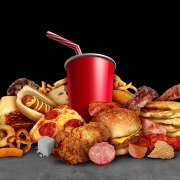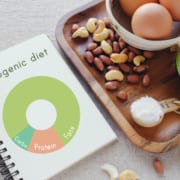Stop Eating These Foods And Clear Up Your Brain!
Feeling unproductive? Fatigued? Having trouble concentrating? These are just some of the complaints associated with brain fog – or when your brain is not on top of its game.
Brain fog is characterized by cognitive impairments to memory, attention, executive function, and the speed of cognitive processing. It is not a medical condition itself, but rather symptomatic of an underlying condition that can range from poor nutrition or illness to undiagnosed food sensitivities or sleep deprivation.
If you haven’t already spoken to your physician about how you feel, make that priority number one in determining what may be causing your brain fog. In the meantime, there are things you can do right away to “clear up” your brain for optimal functioning. Environmental factors, particularly nutrition, can worsen or improve your symptoms.
Here are 5 types of foods and drinks that may be contributing to your brain fog – and why!
1. Processed foods with MSG
The food additive Monosodium Glutamate (MSG), used as a taste enhancer and flavoring agent, is hidden in almost all processed foods, ranging from bottled salad dressings, soups, and canned goods to many restaurant meals. People who tend to eat a lot of processed foods with MSG can experience physical symptoms that can last from a few hours to days, and the most common of these is brain fog. Here’s how it works:
- Free glutamic acid is the active component in MSG and is converted to glutamate in the body.
- Glutamate is a neurotransmitter, or simply a chemical messenger, that transmits signals between neurons in the brain. However, too much glutamate is toxic to the brain as it triggers an excitotoxic state which leads to cell death.
- In addition, glutamate overload depletes glutathione and other powerful antioxidants that are needed to scavenge free radicals (toxic cellular waste) in the body.
Identifying foods with MSG can be tricky, however, because it goes by many names. For more information on how MSG can be identified on food labels, visit www.TruthInLabeling.org.
How can you make a difference? Focus on eating a variety of whole and unprocessed foods, for one, and eating food products with as few ingredients as possible.
Questions? Give Us a Call!
2. Your “must-have” daily diet soft drink
Aspartame is one of the most widely used artificial sweeteners worldwide, and also one of the most controversial. The public health crisis of rising obesity drove us to embrace the idea of sweetness without the calories. But study upon study has shown that artificial sweeteners, such as aspartame, can do more harm than good.
When aspartame is ingested, it breaks down into 3 different compounds: aspartic acid, phenylalanine, and methanol. Phenylalanine and aspartic acid are amino acids (protein building blocks) that are beneficial to the human body when they occur naturally with other amino acids in foods. However, when consumed in isolated and large amounts, like it is in aspartame, they then are able to cross the blood-brain barrier, excite the brain cells and trigger their death. Even worse, methanol further breaks down to formaldehyde, which is neurotoxic and carcinogenic.
Common symptoms of aspartame toxicity are headaches, mental confusion, problems with balance, and numbness.
3. Processed meats – bacon, jerky & hot dogs
Sodium nitrite, sodium nitrate, and sodium/potassium benzoate are salts added to processed foods, particularly meats, to preserve freshness. The food industry relies on these additives as taste enhancers, and as a way to preserve bright colors that will catch the eye of the consumer.
Although the use of these additives is approved by the Food & Drug Administration in regulated amounts, processed meats that contain these chemicals have been classified as “Group 1 Carcinogen” by World Health Organization (WHO) experts. A large number of health complaints have been reported by consumers; among them skin issues, respiratory problems, headaches, dizziness, and brain fog.
The best way to avoid these additives, commonly found in bacon, jerky, hotdogs, pepperoni, and sausages, is to read the labels and choose to eat unprocessed foods whenever possible.
4. Alcohol
Various components in alcohols can cause sensitivity, and the severity of the allergic reactions depends on the person’s genetic profile; one major symptom being brain fog.
Here is a list of the ingredients in wine, beer, liquor, and spirits that may be worsening your brain fog.
- Sulfite additives are used to sterilize barrels and tanks before fermentation takes place.
- Histamines are suggested to play a major role in allergic-like reactions to wine.
- Ethanol is found to play a role in inducing allergic reactions – especially in Asians and certain other populations – due to their lack of the enzyme that metabolizes ethanol.
- Most beers contain gluten. People who are sensitive to gluten report an improvement in brain fog when gluten is cut out of their diets.
5. Cheese/Dairy
Milk and dairy products, such as cheese, yogurt, and whey protein (found in bodybuilding and energy drinks) are just one of the food categories that the FDA has also recognized as a major allergen, potentially causing allergic reactions in some people that can range from mild to severe, and in some cases can be fatal. Other foods considered major allergens are: gluten, soy, egg, shellfish (two kinds: crustacea and mollusk), tree nuts (such as walnuts, almonds, and cashews), peanuts (in the legume family), certain types of finned fish, and sesame. For people with sensitivities or allergies to these foods, the body sees the proteins as a threat and produces antibodies to chase them out.
If you experience symptoms of brain fog, headache, or digestive discomfort when you eat a specific type of food, you may have a sensitivity but not necessarily an allergy. With either situation it is best to avoid those foods altogether; and be careful when reading labels, as there may be hidden ingredients, especially milk and eggs.
We are here for you, and we want to help.
Our goal is to return you to optimal health as soon as possible. To schedule an appointment please call: 703-532-4892 x2
This article was originally written in July 2017. It was reviewed and updated in October 2024.
Additional References:
Abu-Taweel, G. M., A, Z. M., Ajarem, J. S., & Ahmad, M. (2014). Cognitive and biochemical effects of monosodium glutamate and aspartame, administered individually and in combination in male albino mice. Neurotoxicology And Teratology, 4260-67. doi:10.1016/j.ntt.2014.02.001
Ahluwalia, P., Tewari, K., & Choudhary, P. (1996). Studies on the effects of monosodium glutamate (MSG) on oxidative stress in erythrocytes of adult male mice. Toxicology Letters, 84(3), 161-165.
Foran, L., Blackburn, K., & Kulesza, R. J. (2017). Auditory hindbrain atrophy and anomalous calcium binding protein expression after neonatal exposure to monosodium glutamate. Neuroscience, 344406-417. doi:10.1016/j.neuroscience.2017.01.004
Onaolapo, O. J., Onaolapo, A. Y., Akanmu, M. A., & Gbola, O. (2016). Evidence of alterations in brain structure and antioxidant status following ‘low-dose’ monosodium glutamate ingestion. Pathophysiology: The Official Journal Of The International Society For Pathophysiology, 23(3), 147-156. doi:10.1016/j.pathophys.2016.05.001
VALLY, H. and THOMPSON, P. (2003), Allergic and asthmatic reactions to alcoholic drinks. Addiction Biology, 8: 3–11. doi:10.1080/1355621031000069828
Whitehouse, C. R., Boullata, J., & McCauley, L. A. (2008). The potential toxicity of artificial sweeteners. AAOHN Journal: Official Journal Of The American Association Of Occupational Health Nurses, 56(6), 251-259.
Wild, C. P., & Gong, Y. Y. (2010). Mycotoxins and human disease: a largely ignored global health issue. Carcinogenesis, 31(1), 71-82. doi:10.1093/carcin/bgp264
https://www.foodallergy.org/allergens
http://acaai.org/allergies/types
















Leave a Reply
Want to join the discussion?Feel free to contribute!